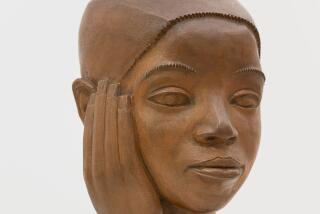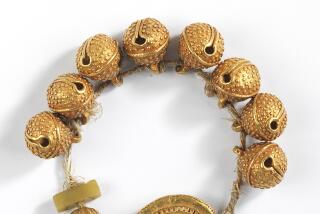Former Fowler Museum director and Ghanaian arts scholar Doran Ross dies
The man who cemented the Fowler Museum at UCLA’s reputation for deeply researched, contextualized, multimedia exhibitions on global arts has died.
Former Fowler Director Doran Ross, a respected Ghanaian arts scholar who spent 20 years at the museum managing or curating nearly 40 African and African American exhibitions shown at 30 venues across the country died Sept. 16 in his Los Angeles home after a long illness, the museum said. He was 73.
Ross joined the Fowler Museum as associate director and curator of Africa, Southeast Asia and Oceania in 1981, when the institution was called the UCLA Museum of Cultural History. He contributed to the development of the museum’s new facility, a three-story $22-million building completed in 1992.
After serving as deputy director and curator of African collections, Ross became the first non-faculty, full-time director in 1996, a position he held until his retirement in 2001.
During his tenure, Ross was committed to temporary exhibitions, believing they were the best use for the museum’s collections. The Fowler now has more than 125,000 objects in its permanent collections.
Ross thought they were a “more dynamic use of collections — presentations that would draw visitors back again and again,” said Betsy Quick, former Fowler director of education and curatorial affairs, and Ross’ partner of more than 20 years.
In 1995, Ross directed “Sacred Arts of Haitian Vodou,” an exhibition depicting voodoo rites and ritualistic objects. The exhibition — which the National Endowment for the Humanities twice rejected before approving a $480,000 grant in 1993 — raised eyebrows at the university.
Ross was insistent, as with all the exhibitions he led, on having a diverse planning group.
“He said, we can’t do this project unless there are Haitians involved, unless there are Haitian priests or priestesses and artists who are consulting,” Quick said.
Quick also collaborated with Ross on the Fowler Museum’s 1992 exhibition, “Elephant: The Animal and Its Ivory in African Culture,” which included 250 objects from 50 African cultures.
“It is not about elephants. It’s about Africans,” Ross told The Times in 1993. “We use the elephant as a hook to introduce children and adults to Africa.”
Ross placed an emphasis on consulting with African scholars and artists when developing African projects at the museum, Quick said. “We definitely did our very damnedest to make sure that we had a diverse group of people around the table and in positions of power and authority and expertise.”
Ross grew up in Fresno and was introduced to African art while studying art history and psychology at Cal State Fresno as an undergraduate student. He received his master’s degree in art history at UC Santa Barbara. Before working at the Fowler Museum, Ross lectured at several California institutions including UC Berkeley, CalArts and Santa Barbara City College.
A prolific scholar, Ross was an editor of the UCLA journal of African Arts from 1988 to 2015. Since 1974, he made nearly 40 research and museum development trips to 18 African countries to help train young staff and to consult on policies and practices. Particularly fascinated with the dress of the Akan peoples of Ghana, he was co-editor of “Textile: The Journal of Cloth and Culture from 2002-2012.”
In addition to his research, museum duties and mentoring young scholars, Ross was a lover of music — particularly, Western classical, American jazz and contemporary African — and of film, amassing a library of 5,000 CDs and about 3,000 DVDs.
“He just was interested in everything,” Quick said. “You see that in his writing, you see that in his collections and what he loved and what he was working on … there weren’t enough hours in the day to do all the things that he wanted to do.”
About 10 years ago, Ross began working with a Ghanaian sign painter, Kwame Akoto. Many of Akoto’s paintings will be included in an upcoming exhibition, along with another exhibition showcasing flags from southern Ghana, to honor Ross’ legacy at the Fowler Museum.
“He just truly, truly loved the process of developing exhibitions,” Quick said.
Ross is survived by Quick and his sister, Diane.
More to Read
The biggest entertainment stories
Get our big stories about Hollywood, film, television, music, arts, culture and more right in your inbox as soon as they publish.
You may occasionally receive promotional content from the Los Angeles Times.











